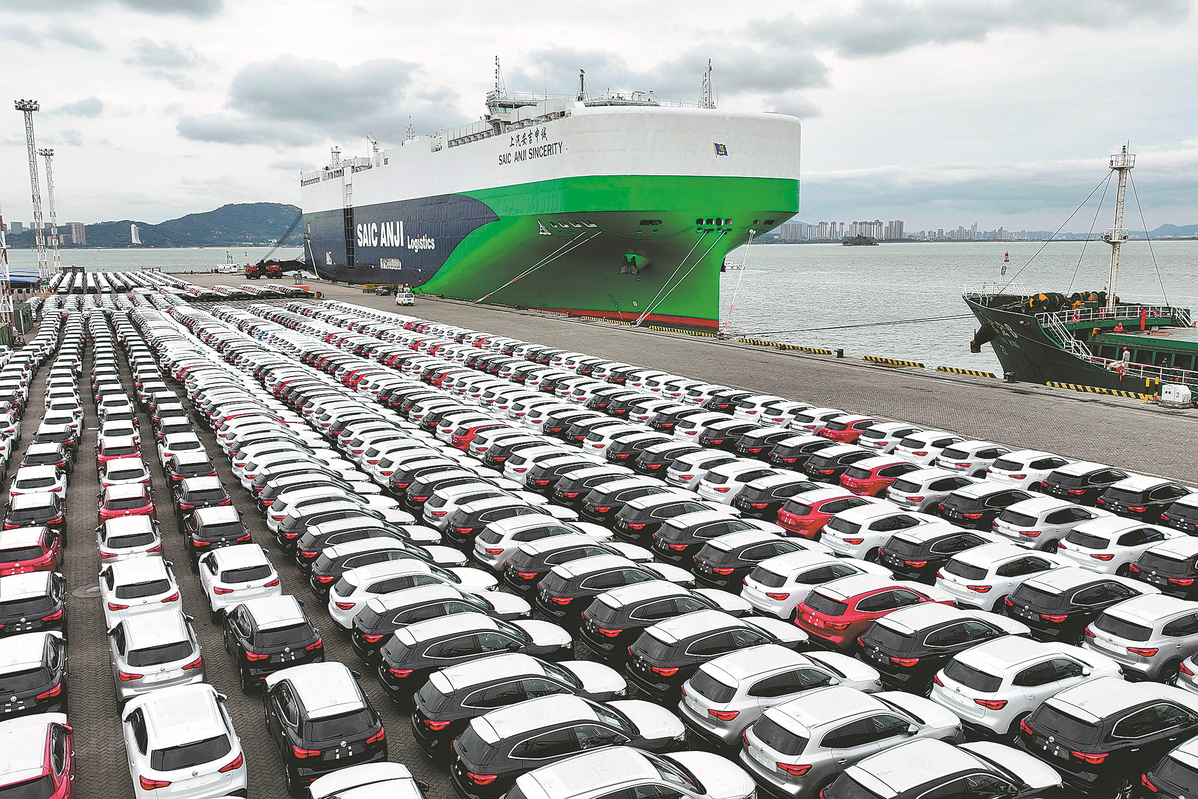As EV tariff talks continue, China urges pragmatism

BEIJING/BRUSSELS — China has reiterated its stance on reaching a mutually acceptable solution to a trade spat involving Chinese electric vehicles exported to the European Union as talks between the two sides continue.
Scholars and stakeholders have elaborated on the indispensable role of Chinese EV makers, given their scale advantages and leading technologies capable of catering to diversified consumer needs, and, broadly speaking, the world's need to go green.
Indispensable EVs
There has been growing consensus that the world will require significantly accelerated development in the field of green energy to push forward decarbonization, and that China's affordable clean tech products will only make positive contributions to that end.
Jeremy Jurgens, managing director of the World Economic Forum, said in a recent interview that China is clearly already leading in new energy technology, represented by EVs. He noted that the country's EV sector has strong advantages spanning battery technology, software development and a large domestic market.
The 1.4 billion people in China mean varied individual tastes in different regions and cities, he said. As the car moves from a mechanical device to a software device, the ability to adapt software to different interests becomes an important competitive advantage. "So the extent that China can adapt that software in the vehicle to different market preferences and needs will actually be a strong competitive advantage in the future."
Douglas Johnson-Poensgen, CEO of Circulor, a solutions provider that can trace the auto industry's complex supply chains, told Xinhua that the world needs more renewable energy and a faster energy transition.
"We're all humans on the same planet. We need to build renewable energy infrastructure at the pace if we have any chance of getting toward net-zero carbon emissions in a sensible time frame," Johnson-Poensgen said.
He added that China clearly has economic leadership when it comes to producing green products and driving down the prices of EVs and solar panels to make them more affordable, which will ultimately be good for the world.
"It's pretty clear that the future will be in electrical vehicles," Jurgens said, acknowledging the disruption that the rapid advancement of EVs has brought to traditional manufacturers that have not yet transitioned from internal combustion engines to EVs.
"It is understandable that some countries may want to delay that transition to be able to allow their domestic producers more time to make the transition. But overall, I think we still need to have far more production of electric vehicles to further electrify the economy," Jurgens said. The advancement and dissemination of these technologies will allow consumers to start shifting their energy consumption patterns, he added.
"As China looks for sustainable, affordable and secure energy sources, China not only improves its own position, it actually makes a contribution to global sustainability and can help the world achieve decarbonization targets," he said.
Competition benefits
Accusations have arisen that Chinese EVs are being dumped in global markets at low prices, but consumers doubt the logic of such rhetoric as not everyone can easily afford an expensive EV.
A recent report from the Canada-based Toronto Star interpreted this vividly, arguing that car drivers must be considered in tariff responses because people are the ones who buy cars, and not all consumers can afford a Tesla or a Polestar. "We must not penalize consumers and slow our climate efforts in the meantime."
It said an "inelegant" trade move could result in even fewer models and higher prices for consumers.
Danny Quah, dean of the Lee Kuan Yew School of Public Policy at the National University of Singapore, said that dumping is when an exporter sells a product in a foreign country at a price lower than it does on its own, hence running losses. He said that many Chinese products — especially batteries and EVs — are cheaper in China than in Western markets, including the EU.
He said that China's exports of EVs are only about 14 percent of its total production — a smaller fraction than that of cars exported from Japan and South Korea. "China subsidizes the EV industry, yes, but for consumers to purchase EVs, not for producers to make them. Those subsidies can purchase Teslas just as easily as BYDs."
"While rightly looking out for their own industries and businesses, everyone needs to think a little also about the good of our planet. The world needs clean energy. Emerging economies still need massive sustained bursts of energy to develop, and they cannot afford costly technologies to replace fossil fuels," he added.
Jurgens said that most of the EV supply is in fact for Chinese consumption, and that the rate of growth of EV utilization in China is very high and probably growing at the fastest pace in the world. "If you look at the actual market dynamics here, this is one of the most competitive markets in the world."
Xinhua

